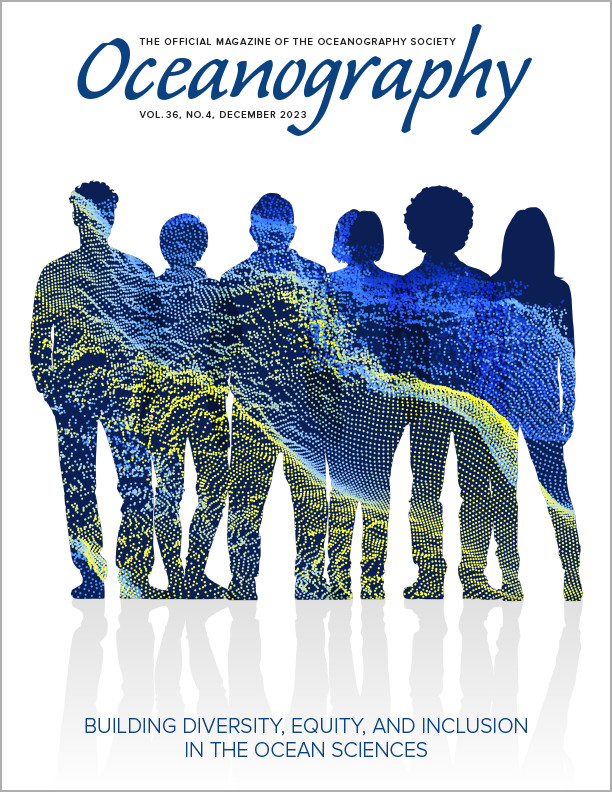Introduction
The goal of Alliance-Building Offshore to Advance Resilience and Diversity (All-ABOARD) is to cultivate teams of diversity, equity, and inclusion (DEI)-champions that are, by definition, both resilient and accountable for making meaningful change at their institutions. We define DEI-champions as those who effectively leverage their positionality (informed by their power and privilege, but not limited by it) to lead, regardless of whether they are recognized by their institutions as “leaders.” Positionality, in part, describes the intersection of one’s various identities; in this case, it includes our participants’ academic identities, for example, as students, administrators, or faculty members.
We refer to All-ABOARD intentionally as an “intervention” because we pursue a distinct avenue for success by designing the program to specifically grapple with generating individual actors and teams capable of making and sustaining institutional change. Sustained efforts to increase participation in the geosciences of historically marginalized groups have had limited success in recent decades due in part to the inability to empower individuals or groups to pursue institutional change (e.g., Sidder, 2017; Bernard and Cooperdock, 2018; Beane et al., 2021; Cisneros and Guhlincozzi, 2023). We hypothesize that engaging intergenerational teams in an immersive context could lead to a cohort of resilient DEI-champions.
Inspired by the transformative power of offshore experiences, All-ABOARD relies on an immersive professional development environment that occurs over four phases. Here, we describe the early phases of this intervention and present preliminary quantitative and qualitative evaluations of participants’ self-understanding along several axes of identity and experience. We also comment on next steps, successes, adaptations due to COVID-19, and key takeaways.
Program Description
Be the Messenger (BTM) is a theoretical framework that seeks to equip individuals with the tools and understanding necessary to implement DEI initiatives within their environments and communities (Starks and Matthaeus, 2018). Previously, this framework has been applied in a variety of corporate, nonprofit, and governmental contexts; All-ABOARD represents the first time that the framework has been applied to design a structural intervention in an academic context. While a complete articulation of the framework is beyond the scope of this paper, we focus on how we cultivated immersive learning environments through three central tenets of the BTM framework: self-reflection, learning to navigate confirmed bias, and frequency and duration. The framework posits that to become effective “messengers” who can make changes in their communities, individuals must reflect on, understand, and contextualize their baseline perceptions of identity, culture, diversity, and respect (Starks and Matthaeus, 2018). A deep understanding of these components allows them to recognize their own biases and navigate “confirmed biases,” or the ideas, perspectives, and positions that influence decision-making. Once identified, differences in positions enhance the efficacy of a diverse team, rather than limit it, and the biases are leveraged, so teams learn from one another and confront institutional barriers together. Furthermore, a central tenet of BTM is that frequency and duration (e.g., of conversations, interventions, programming, and training) are critical components of developing a sustainable, individual understanding of confirmed bias and cultivating a strong team. A commitment to dedicating regular intervals of time is crucial to the success of social change initiatives and to maintaining group cohesion. We leverage the BTM framework to design an intervention to cultivate teams of geoscience DEI-champions and to evaluate the effectiveness of the intervention’s early stages (White et al., 2019; Graham et al., 2022).
Phase One: Recruitment and Selection of Participants
The project leaders relied on our collective networks and posts on social media (then Twitter and Facebook) and sent emails through various listservs with an intentional focus on recruiting intergenerational teams from predominately white institutions (PWIs). The All-ABOARD intervention was designed for implementation at PWIs because these institutions play a large role in creating and maintaining racial homogeneity in the geosciences despite being over-resourced relative to their peer institutions (e.g., Historically Black Colleges and Universities; McGee, 2020). We held an informational webinar to kick off the month-long application period and to provide more details about All-ABOARD.
Each team was required to submit members’ individual personal statements and a group statement on their plan to pursue a DEI goal at their home institution. Applicant teams were evaluated based on the following criteria: potential for lasting impact on their institution, potential to support the next generation of diverse geoscience leaders, potential for their institution to become a geosciences DEI leader, and ability/willingness to commit department or university resources to a focused DEI initiative. Each team application was evaluated for team-member composition, emphasizing diverse academic roles and positions from undergraduate to dean or department chair. In total, eight teams applied, and of the four teams selected, all were public PWIs in the US Southeast (Figure 1): two R1 universities and two smaller regional universities. Teams ranged from four to five members and included, across all teams, tenured professors (6), pre-tenure professors (3), deans (2), graduate students (2), undergraduates (2), and one postdoc and one staff member. Two teams had student participants continuously through the retreat, one team had a student graduate only before the retreat, and one team had no student participants.
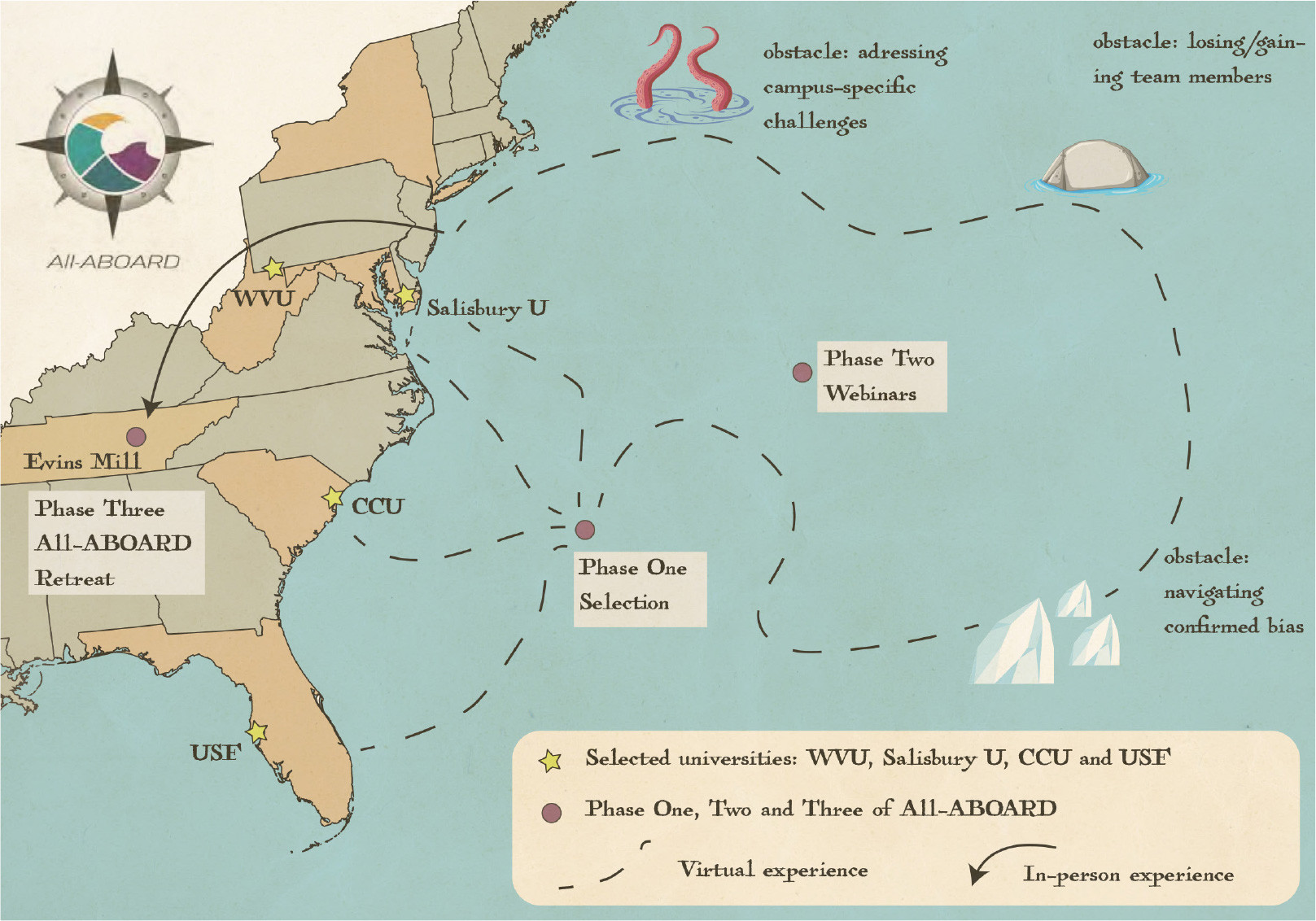
FIGURE 1. Stylized map depicting the All-ABOARD program and relative timeline. Selected teams hailed from four institutions (yellow stars). Informed and scaffolded by Phase Two, the monthly webinars, teams navigated a number of obstacles (represented on the map by various hazards) while building capacity and creating plans at their own institutions to advance change. Phase Three constituted an in-person retreat in Evins Mill, Tennessee. Virtual experiences are represented with dashed lines and in-person experiences are represented with a solid line. CCU = Coastal Carolina University. USF = University of South Florida. WVU = West Virginia University. > High res figure
|
Phases Two and Three: Webinars and Retreat
In April 2021, we initiated the yearlong, immersive program that included nine webinars and concluded with an in-person retreat in March 2022 (Figure 1). Together with the webinars and retreat, we designed the entire curriculum in a way that allowed participants to engage in repetitive, reinforcing actions that occurred in different dimensions (virtual and in-person, social and academic). Between programmatic webinars, individual teams met both in-person and online to complete assignments and develop their action plans. Four of the programmatic webinars focused on community building and allowed participants to get to know one another better, while five were thematic and addressed an aspect of identity, culture, diversity, and respect (Table 1). We conducted the webinars via Zoom to take advantage of the shift in working culture in response to COVID-19 and to accommodate our teams’ locations throughout the southeastern United States. We met monthly, something that would have been impossible with only in-person gatherings, to support the teams’ immersion in their work.
TABLE 1. All-BOARD Intervention curriculum for the webinar series (left panel) and for the in-person retreat (right panel). Green = Community building, Yellow = Be the Messenger. Blue = Science identity. Pink = Action planning. > High res table
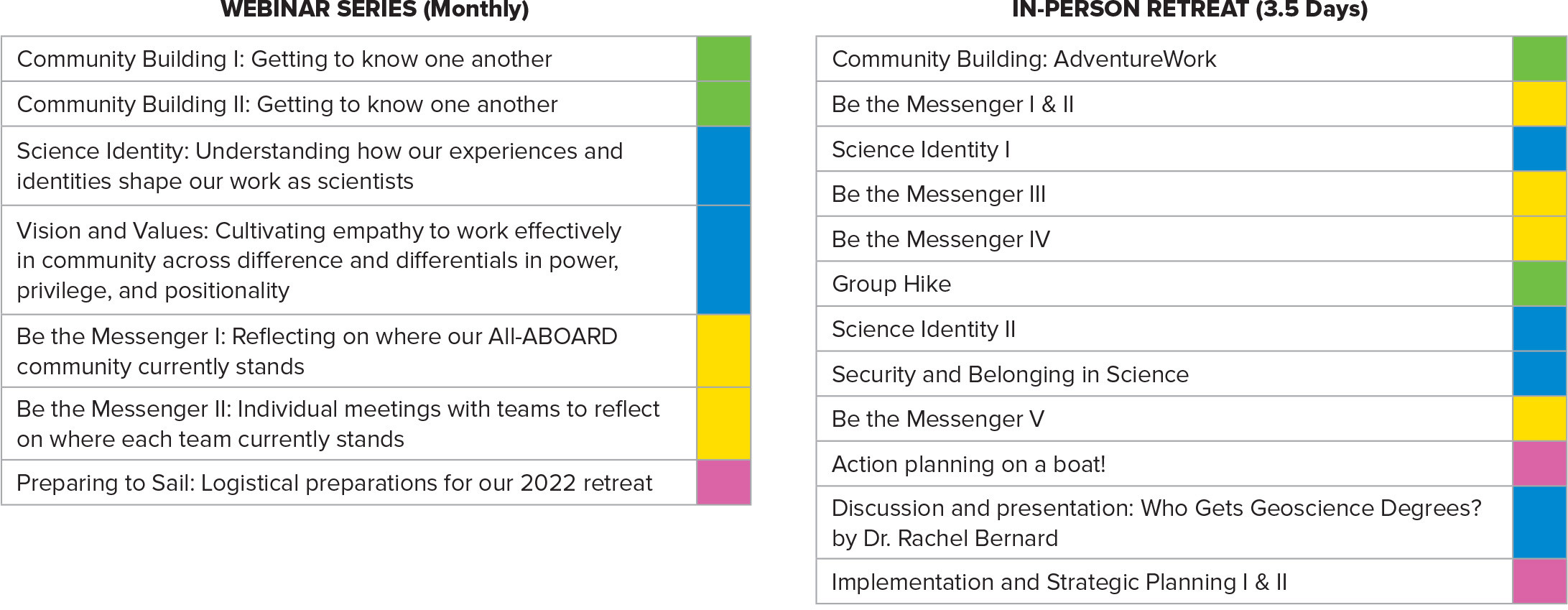
|
The in-person retreat took place over 3.5 days in Central Tennessee at Evins Mill woodland resort (Figure 1). Importantly, the original concept for the All-ABOARD intervention imagined hosting this retreat aboard a research vessel. Ultimately, this was not feasible due to ongoing complications with COVID-19 and scheduling constraints among our participants and leadership. Nevertheless, we provided both a secluded environment and a modified “offshore” experience as part of the retreat, fulfilling the core elements of our original vision. The retreat began with a team-building activity and each subsequent session was thematic and addressed aspects of identity, culture, diversity, and respect or was a dedicated work session for strategic planning within teams (Table 1). The penultimate strategic planning session was conducted aboard pontoon boats at a nearby lake, allowing each team the opportunity to work together in a focused, sequestered context. The daily schedule was also interspersed with shared meals, excursions, and unstructured community-building time. We further cultivated immersion by emphasizing continuity in the program during both virtual and in-person engagements. We regularly returned to topics and activities like community-building, individual and group assessments, and thematic workshops (Table 1).
Evaluation
We measured participants’ resilience and leadership with pre- and post-surveys that quantified the impact of incorporating the BTM framework into the yearlong immersive programming (Phases Two and Three). The pre-survey was administered to individuals two months after acceptance into the All-ABOARD program, and the post-survey was administered one year into the program, after the retreat. In addition to these quantitative surveys, participants were interviewed in small groups during the retreat to collect qualitative data on common narrative elements. Full evaluation of the intervention will take place at the end of Phase Four (Campus Visits) to coincide with the predicted successful implementation of each team’s action plan on its home campus. Evaluation techniques and interview questions will be informed by the preliminary analysis presented here.
Results
Our survey results (n = 15) show a multifaceted change with respect to participants’ senses of leadership but demonstrated a greater change in resilience after the yearlong core program. Participants reported an increased agreement with the statements: “Others tend to not see me as a leader” (0.3-point change), “I am comfortable leading teams,” and “I am comfortable contributing to a team led by someone else” (0.2-point changes) (Table 2). Responses to the other questions about leadership showed little change between pre- and post-retreat surveys (Table 2). Participants disagreed more with the statement: “When I experience setbacks and/or resistance to something I am doing, I usually decide to do something else” (–0.5-point change) and agreed more with the statement: “When I experience setbacks and/or resistance to something I am doing, I become more resolved to do it” (0.3-point change) (Table 2). Moreover, participants disagreed more with the statements: “I regularly think about leaving my current career trajectory” (–0.4-point change) and “I fear failure” (–0.3-point change) (Table 2). We used the transcribed small group interviews as qualitative data to construct a composite narrative comic about experiences during the All-ABOARD intervention from the perspective of a participant (Figure 2). We focused on themes and sentiments that came up repeatedly and highlighted elements that cut across positionality and institution. Though the text in the comic has been pulled directly from participant interviews, it has been edited for clarity and to remove any identifying characteristics.
TABLE 2. Perspectives on leadership and resilience pre- and post-retreat (n = 15). Responses were measured on a Likert scale as follows: 5 = Strongly Agree, 4 = Agree/Somewhat Agree, 3 = Neutral/Neither Agree nor Disagree, 2 = Disagree/Somewhat Disagree, 1 = Strongly Disagree. Mean scores and changes are reported to the nearest tenth of a point. > High res table
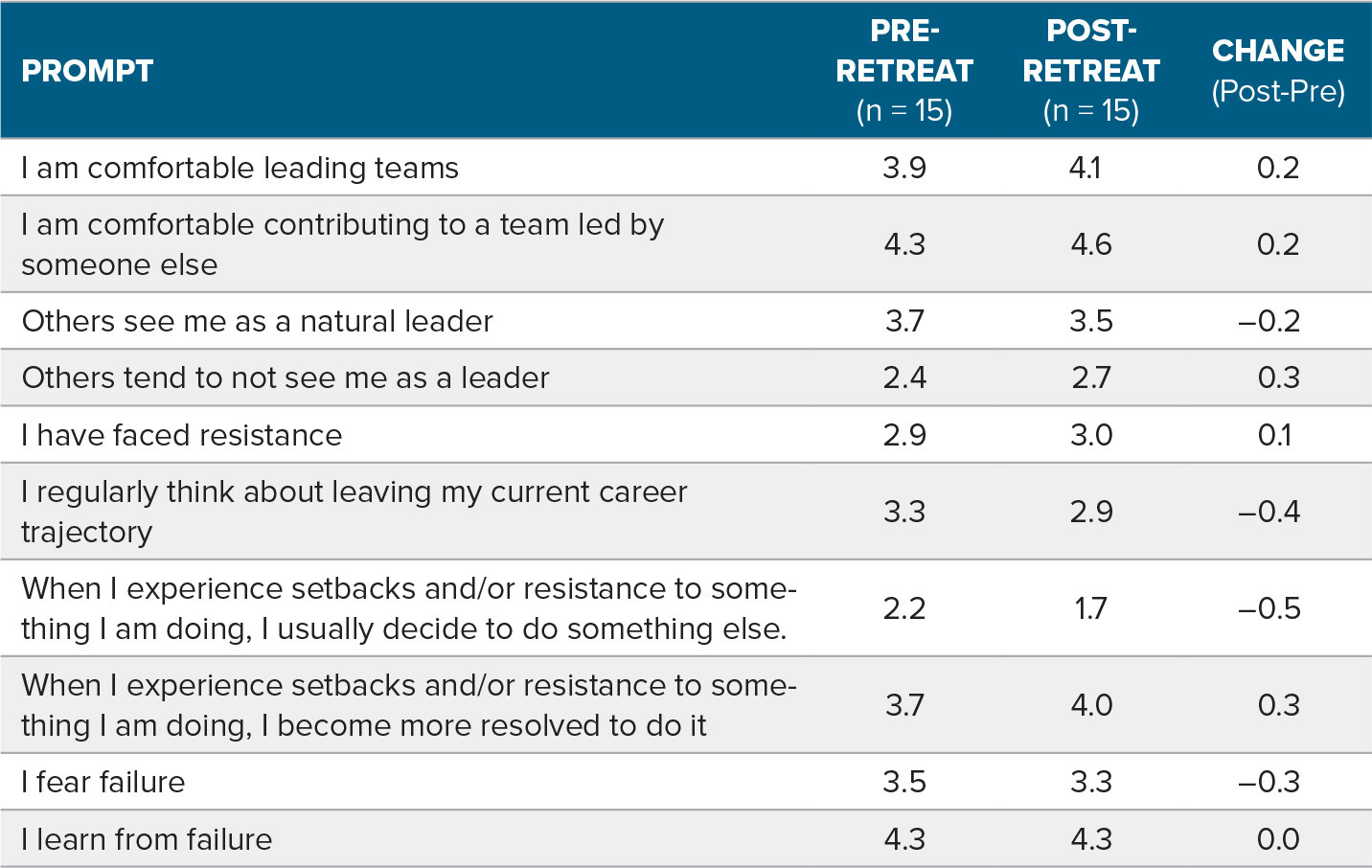
|
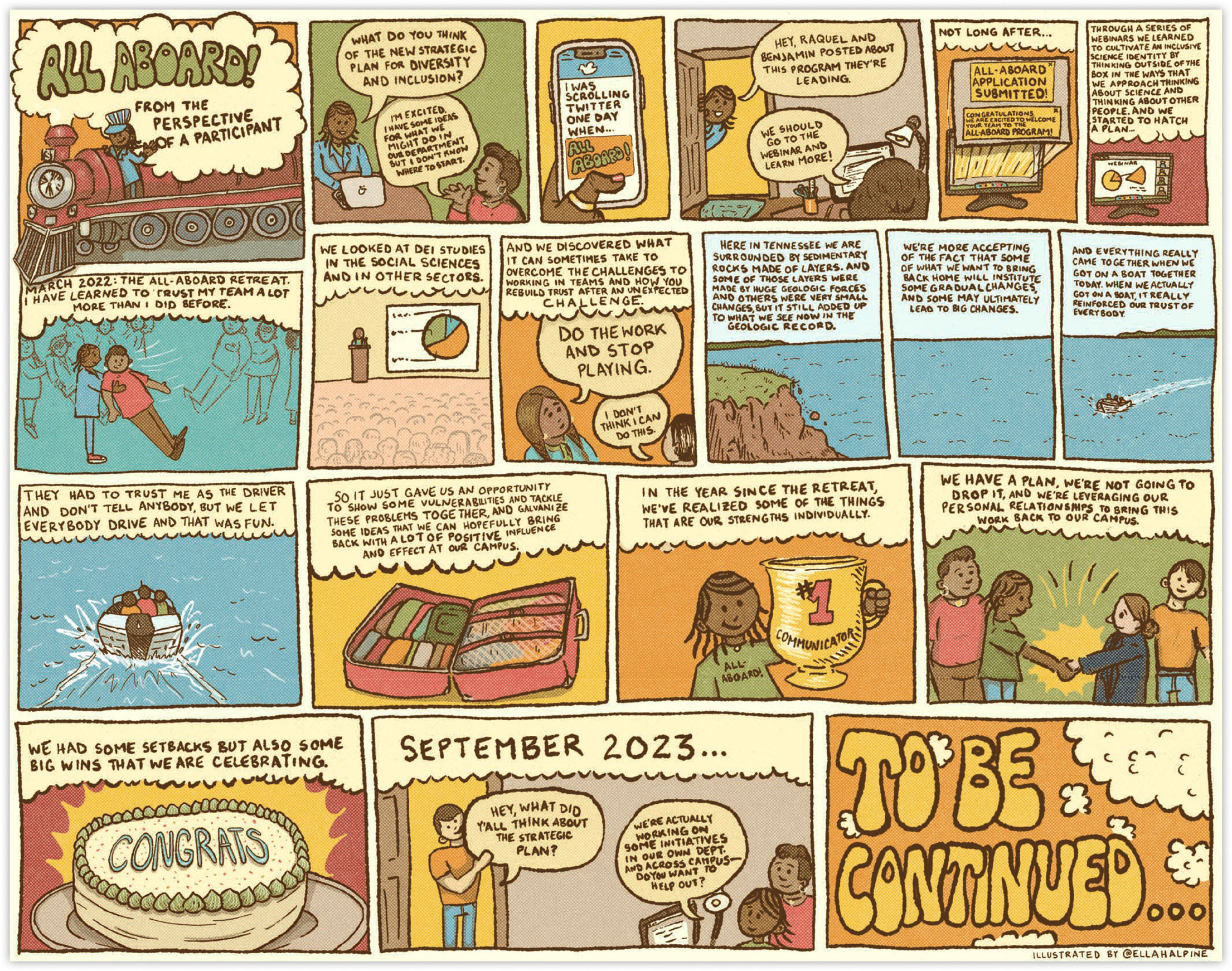
FIGURE 2. Composite narrative of the All-ABOARD experience from the perspective of a participant. Text is drawn from transcribed interviews conducted with teams during the All-ABOARD retreat. In constructing the narrative, we emphasized themes that emerged in the responses of more than one participant. Illustration by Ella Halpine (@ellahalpine). > High res figure
|
Lessons Learned
Immersive Experiences Facilitate the Cultivation of DEI-Champions
The immersive experience was successful in encouraging participants to embrace the identity of a DEI-champion as shown by increased comfort with being a leader and increased resilience in the face of challenges (Table 2). Informed by the BTM framework, the All-ABOARD intervention featured frequent community-building sessions and thematic trainings ahead of the in-person retreat to build and establish community. This context provided the social foundation and shared understandings for the in-person experience to be most effective. Each session allowed participants to come to a set of shared values and to practice formulating identities in a group setting. For example, through a session about science identity (Table 1), we encouraged participants to expand their understanding of science identity by inviting other elements of their social identities into their science identities. This shared understanding was critical for participants to view their identities as DEI-champions as an integral part of their scientific identities. Importantly, the immersive experience allowed participants to engage with each other frequently enough that they could act as both witnesses to, and role models for, shifting views on science identity. Our efforts to foster malleable science identities that include being DEI-champions enhanced our participants’ senses of resilience.
Participants reported that immersive elements of the retreat impacted their identities as DEI-champions by enhancing their confidence as leaders and their senses of resilience. Importantly, being in a retreat environment made the intervention more impactful because participants were separated from “daily life” with all its distractions (Figure 2). Our original objective for doing the retreat at sea was to provide space and time for intense focus. We were able to recreate this focus during the land-based retreat by convening our participants in a rural, mountainous environment that removed them from their home contexts. We were also able to partially re-create the experience of being “shipboard” by including one session that took place on pontoon boats (Table 1, Figure 2). Each team, accompanied by a project leader, spent one afternoon working together on strategic plans for their DEI initiatives aboard a pontoon boat. Participants reported that being on a boat helped them bond as a team because they were sharing a new experience (Figure 2). The results supports our hypothesis that immersive geoscience experiences can, with the right frameworks, equip participants to become DEI-champions.
Intergenerational and Interinstitutional Cohorts Enhance Learning and Accountability
Being a part of an intergenerational team encouraged participants to think beyond normative institutional ideas of hierarchy. Participant responses indicated that the intergenerational team structure was a highly valuable and impactful source of learning, and participants felt especially accountable to themselves and their teams (supplementary Figure S1a). The utility of intergenerational teams is that they encourage disregard for titles and thus work to humanize participants and facilitate lateral mentoring (Murrell and Onosu, 2023). This in turn facilitates the use of a distributed leadership model (Harris and DeFlaminis, 2016), which we cultivated for our teams through interrogating confirmed bias. In particular, teams learned to reduce the effects of bias related to titles while leveraging the inherent power in titles to advance social change (Starks and Matthaeus, 2018; Murrell and Onosu, 2023). In contrast to normative institutional ideas of hierarchy, we find this distributed leadership model enhances resilience in terms of participants wanting to overcome challenges rather than to give up (Table 2). As project leaders, we observed that student members were especially critical for providing fresh perspectives and insight. We observed that, compared to groups with either undergraduate or graduate student team members, groups that lacked student members encountered more challenges, and found those challenges more difficult to meet. This demonstrates how students were able to take on the role of “teacher” and “expert” in discussing DEI initiatives. Not only are students often on the receiving end of such initiatives, they are often leaders in developing new initiatives that serve historically excluded groups and aim to change or challenge institutional culture (e.g., Keisling et al., 2020; Guhlincozzi and Cisneros, 2021; Cisneros and Guhlincozzi, 2022; Valdez-Ward et al., 2023). This observation is directly linked to the BTM model of distributed leadership, where the student has just as much voice as the faculty member or administrator.
The inter-institutional cohorts allowed for enhanced accountability within each institutional group. Participants reported that one of the most impactful activities included the opportunity to work with their team and then to get feedback on their ideas from other teams (Figure S1c). In fact, participants reported learning the most from those not at their own institutions (Figure S1b). However, participants’ responses indicated that the greatest sense of accountability beyond being accountable to themselves was to their teams, and the least was to their institutions (Figure S1a). We note that the intergenerational team structure and emphasis on distributed leadership through the BTM framework are potential reasons for to whom or what participants felt most accountable (Figure 2). The lack of accountability to an institution may reflect institutional alienation that is experienced by people trying to make change on their campus (Rodrigues et al., 2021). The All-ABOARD intervention demonstrates that the learning is taking place outside of the team across intergenerational boundaries and that the accountability is to other members of the team in favor of the institution.
Conclusions and Future Directions
The results show that immersive experiences, intergenerational teams, and inter-institution cohort building are effective components for cultivating DEI-champions in geoscience, meaning they lead to enhanced resilience and accountability. Specifically, we demonstrate that presenting the Be the Messenger framework in a geoscience context via an immersive webinar series and an in-person retreat was powerful. These results are a promising indication that the next steps of the All-ABOARD intervention will be successful. In this final fourth phase, each team is carrying out its planned strategic intervention as designed during participation in All-ABOARD. To sustain frequency and duration of community-building among teams, each team is hosting a campus visit for the whole All-ABOARD team, with the first one held in April 2023. At the first campus visit, we were able to celebrate and learn from the host team’s progress on their action plan, including successfully advocating for DEI contributions to be a metric in tenure and promotion.
The convening of intergenerational teams, in contrast to homogenized teams featuring members at or near the same career stage, was the most successful aspect of our intervention. We strongly encourage similar interventions to foster team compositions that span positions and career stages, and specifically include student participation. Although our teams included many different positions, not all teams included students, and we noticed that teams without student members faced additional challenges. Our results demonstrate the potential of intergenerational teams to encourage new ideas, build lateral mentoring opportunities for all members, and be innovative and effective in advancing change.
Work to test this model on a seagoing vessel remains a priority. However, this study shows that a land-based retreat can also provide an immersive experience. An unanticipated advantage of the land-based model is its ability to be scaled. For example, this intervention could be translated to other STEM fields or tailored for subfields within geosciences. Further, because much of the programming was virtual, this intervention could readily be scaled to include more teams and institutions. Importantly, this model is not tied to one set group of individuals or participants and could readily be replicated with new teams and institutions to equip the next generation of intergenerational DEI-champions with strategic tools to transform the geosciences.
Acknowledgments
This project was supported by NSF Award #2035093. The authors thank Kennedy Hrncir, Chelsea MacDonald, and Caroline MacDonald for their help with implementing the in-person retreat and Rachel Bernard for her keynote presentation. The authors thank Ella Halpine (@ellahalpine) for her creation of Figure 2. IRB Protocol AAAT2941.

